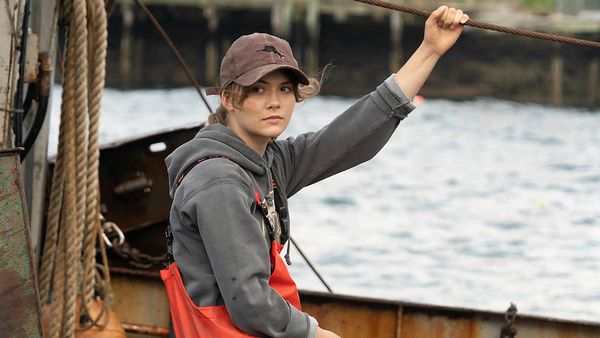Eye For Film >> Movies >> CODA (2021) Film Review
CODA
Reviewed by: Jeremy Mathews

The world could do with more teen movies like CODA. Not because Sian Heder’s film is revolutionary — the pieces are more or less what you expect to see from a coming-of-age story with a bit of romance. But it approaches its characters with an unabashedly sweet desire to depict the fragility and insecurity of teenagedom (along with humanity as a whole). Free of ironic detachment, it’s able to reach real emotional truths and show the younger members of its audience that not knowing how to get everything right is a way of life.
Emilia Jones stars as Ruby, who lives in a New England fishing village, and wakes up at three every morning to help her dad and brother run their small fishing boat. Then she goes to high school and tries to stay awake. As the title’s acronym obliquely informs us, Ruby is a child of deaf adults. Her brother is also deaf, leaving her as the family’s default interpreter.

She also loves music and is a gifted singer — not the most ideal hobby for her family, who don’t have immediate access to her recognise her talents. Her dad’s main music consumption is gangster rap — he likes the vibrations, and blasts it out the car when he picks her up from school.
Marlee Matlin and Troy Kotsur plays Ruby’s parents — a loving couple who are still unabashedly hot for one another. When Ruby has to interpret for them at a doctor’s appointment and they’re told they have jock itch and can’t have sex for two weeks, they indignantly deride that restriction as impossible to follow. Daniel Durant completes the family as older brother Leo, an amicable smartass who knows he could be a stronger member of the fishing community if it weren’t for the hearing barrier.
Jones melds wonderfully with her fellow cast members, and the ensemble’s chemistry makes them feel like a true family that’s been loving, laughing and annoying each other forever. Matlin and Kotsur’s free spirit provides humour for the film and mortification for Ruby. And Leo has a classic relationship with his sister, the only distinction being they communicate their cleverly crude insults via sign language.
Ruby grew up hearing every word people would said about her family, and is extremely protective of them. But she also becomes understandably frustrated over the need to constantly serve as hearing interpreter — a task made all the more difficult when she’s trying to pursue her own dreams, or even simply the boy of her dreams (Ferdia Walsh-Peelo).
While Heder’s screenplay relies on familiar beats, her writing and direction reveal a compassion and desire to understand each character’s feelings and emotions. Ruby’s family love her — they don’t want her to give up music out of malice like an overbearing father in an ‘80s movie. But they also don’t fully understand her passion. On top of that, fishing income has been on the decline, and the family have been struggling to make ends meet while also feeling cut off from their fellow fishermen. It makes Ruby’s struggles more sympathetic because they are real issues to grapple with, not convenient obstacles that only exist to be overcome.
Heder’s attention to character depth also helps the elements that feel a little broadly drawn. For example, Ruby’s music teacher, Mr Villalobos (Eugenio Derbez) has a flamboyant personality that sometimes tries too hard for comic relief, and much of his coaching seems to be motivation to stop our heroine from shyly mumbling while she sings. But he also clearly cares about his students and illustrates the importance of having people who are willing to believe in and foster talent.
Is it a little cheesy? Sure, but it’s also poignant. And that is the simple — but not easy — key to CODA’s appeal.
Reviewed on: 03 Feb 2021
















